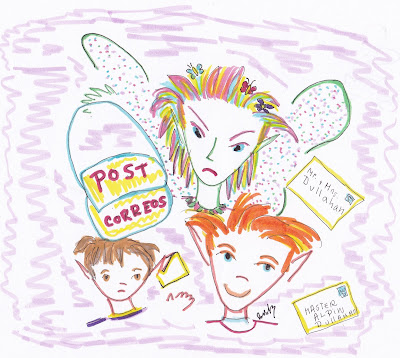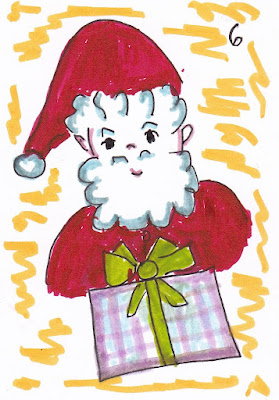Enter a forest with respect. Or else...
Entra en un bosque con respeto. Porque si no...
Lord Randal was a young, and at least in his mother's opinion, handsome man.
Lord Randal era un hombre joven y, al menos en la opinión de su madre, muy guapo.
As he himself admitted, he went hunting in a greenwood. And when he came out of there, he felt like he was dying.
Según dijo él mismo, había entrado en un bosque verde - sería primavera o verano - para cazar. Y de ahí salió sintiéndose morir.
What exactly happened in the wood, we will never know. The story Randal told was too strange and absurd to be easily believed.
Lo que pasó ahí dentro nunca lo sabremos del todo. La historia que contó Randal era demasiado absurda y no era fácil de creer.
Click on Lord Randal to read our translation to the Spanish of this old ballad from the Borderlands, or the same in English. You will also find a link there to where you can hear it hauntingly sung by an Italian professor. .
Pincha en La Balada de Lord Randal para leer nuestra traducción al español de esta antigua balada de la frontera Anglo-escocesa y/o una versión en inglés de la misma. También encontrarás un vínculo que te llevará a donde podrás escucharla cantada en inglés, casi sobrenaturalmente, por un profesor italiano.
And if you feel like working, below are some exercises on this subject, first in English and then in Spanish.
Y si tienes ganas de trabajar, a continuación tienes unos ejercicios sobre este tema. Primero vienen en inglés y después en español.
Exercises in English:
I – True or false. Explain all your answers.
___1.
This ballad takes the form of a dialogue between a mother and one of her sons.
___2.
Lord Randal says that he has been hunting in the greenwood.
___3.
He tries to hide from his mother that he is dying telling her he is tired and
wants to go to bed.
___4.
Lord Randal says that he met some friends in the forest.
___5.
Lord Randal says he caught and ate a fish in the forest.
___6.
Lord Randal’s mother asks him who ate the leftovers.
___7.
Lord Randal says his horse and his hounds died.
___8.
Lord Randal’s mother realizes he has been poisoned, but he refuses to admit
this to protect his true-love.
___9.
Lord Randal says his stomach is upset.
___10.
Lord Randal’s mother immediately makes his bed and calls a doctor, who only
makes matters worse.
___11.
Lord Randal makes an oral last will and testament.
___12.
He leaves his mother his sheep.
___13.
Randal’s sister is to inherit his cash.
___14.
His brother is to receive his house and his lands.
___15.
Lord Randal seems to believe that his true-love killed him.
II -
Match these words with their meanings:
___1. weary a. dog
___2.
greenwood b.
sweetheart
___3.
true-love
c. pass away
___4.
eel d. tired
___5.
pan e. ill
___6.
leavings
f. falcon*
___7.
hawk
g. serpent-like fish
___8.
hound h. a forest in spring or
summer
___9.
stretch one’s legs out i.
leftovers
___10.
sick j. a
round metal container
III – Here are two hypotheses that explain
what killed Lord Randal. Fill in the blanks with these words to complete them: belonged,
fed, natural, killed, spoiled, forbidden, guise, poisoned, poisonous, intoxicated,
A.
Lord Randal went to the
forest to hunt and to picnic there. He went with his true-love, who __________ him
food that wasn’t _________, but was ___________. He became ___________ and died
an accidental but __________ death.
B.
Lord Randal went hunting in
the greenwood. He entered a ___________ part of the forest and probably tried
to kill or __________ an animal that __________ to the fairies. They made him
hallucinate. A fairy appeared to him in the ___________ of his true-love. He
thought she offered him eels to eat, but these were really ___________
snakes.
IV – Speaking or writing:
1. Which of the two options above would you
say is what happened to Randal? Explain your answer. Is a third option
possible? If so, tell us about it.
2. What do you think happened to Lord
Randal’s true-love? Why?
3. What would happen to this ballad if
instead of “bed” the author had used “tomb” and “dying” instead of “sick at the
heart”? Did the mother finally get to make that bed?
Footnote: A hawk and a falcon are not exactly
the same bird. Though often confused, they vary in size and the shape of their
wings is different. So are their beaks. In Spanish, a hawk seems to be an halcón, and a falcon a gavilán, which makes matters even more
confusing. But we could be wrong. We have never heard of anyone going hunting
with a gavilán. And then there is the falcon-halcón of Sir Fedrigo, but that´s
another story.
Ejercicios en español:
I – Verdadero o falso. Hablando o
escribiendo, explica todas tus respuestas.
___1.
Esta balada toma la forma de un dialogo entre una madre y uno de sus hijos.
___2.
Lord Randal dice que ha estado casando en el verde bosque.
___3.
Intenta ocultar a su madre que se está muriendo y dice que está cansado y se
quiere acostar.
___4.
Lord Randal dice que se encontró con unos amigos en el bosque.
___5.
Lord Randal dice que pescó un pez en el bosque y se lo comió.
___6. Su madre le pregunta que pasó con las
sobras.
___7.
Lord Randal dice que su caballo y sus perros se comieron las sobras.
___8.
La madre se da cuenta de que han envenenado a su hijo, pero él lo niega para
proteger a su novia.
___9.
Lord Randal dice que tiene el estómago revuelto.
___10.
La madre inmediatamente le hace la cama a su hijo y llama a un médico que lo
acaba de rematar.
___11.
Lord Randal hace testamento oral.
___12.
Deja a su madre sus ovejas.
___13.
La hermana de Randal va a heredar dinero al contado.
___14.
Su hermano heredará la casa y las tierras de Lord Randal.
___15.
Lord Randal parece creer que su novia le mató.
II -
Empareja estas palabras con sus significados en español:
___1. fatigado a. sabueso
___2.
bosque verde b. verdadero amor
___3.
amada c. morir
___4.
anguila d. cansado
___5.
sartén e. enfermo
___6.
sobras f. gavilán *
___7.
hawk g. pez con forma de serpiente
___8.
perro de caza h. un bosque en primavera o verano
___9.
estirar la pata i. restos
___10.
sick j. contenedor redondo de metal
III – He aquí dos teorías que intentan
explicar lo que le ocurrió a Lord Randal. Rellena los huecos con estas palabras
para completarlas.: pertenecía, alimentó, mató, en mal estado, natural, prohibida,
guisa, envenenada, venenosas, intoxicado.
A. Lord Randal fue al bosque. Había quedado
en comer en plan picnic allí con su amada, que le ___________ con comida que no
estaba ____________, pero que estaba ___________. Él quedó ___________ y murió
de muerte accidental pero __________.
B. Lord Randal fue a cazar al bosque. Entró
en una zona _____________ del bosque y probablemente intentó matar o
___________ a un animal que ________ a
las hadas. Estas le hicieron delirar. Un hada apareció ante él en la __________
de su amada. Él pensó que le ofrecía anguilas, pero en realidad eran serpientes
___________. Se las comió o le mordieron y quedó envenenado. Las hadas se
quedarían con sus halcones y sus perros en venganza.
IV
– Hablando o escribiendo, contesta a estas preguntas:
1.
¿Cuál de las dos opciones del ejercicio anterior crees que explica mejor lo que
le pasó a Lord Randal? Explica tu respuesta. ¿Es posible una tercera opción?
Cuéntanosla.
2.
¿Qué crees que le pasó a la amada de
Lord Randal? ¿Por qué?
3.
¿Qué pasaría con la balada si su autor
en vez de “cama” hubiese usado la palabra “tumba” y en vez de “mi corazón
desfallece” hubiese usado “me siento morir.” ¿Crees que la madre llegó a
hacerle la cama a su hijo?
Nota:
Un gavilán y un halcón no son exactamente la misma clase de ave. Pero se confunden
mucho, aunque varía su tamaño y la forma de sus alas y de su pico. Se confunden
tanto que no ha habido manera de que nos aclaremos. Parece que un hawk es un halcón y un falcon es un gavilán, pero no lo tenemos
claro. Y por ahí anda el fantasma del halcón-falcon de Federico, pero esa es otra historia.

































.jpg)











.jpg)












